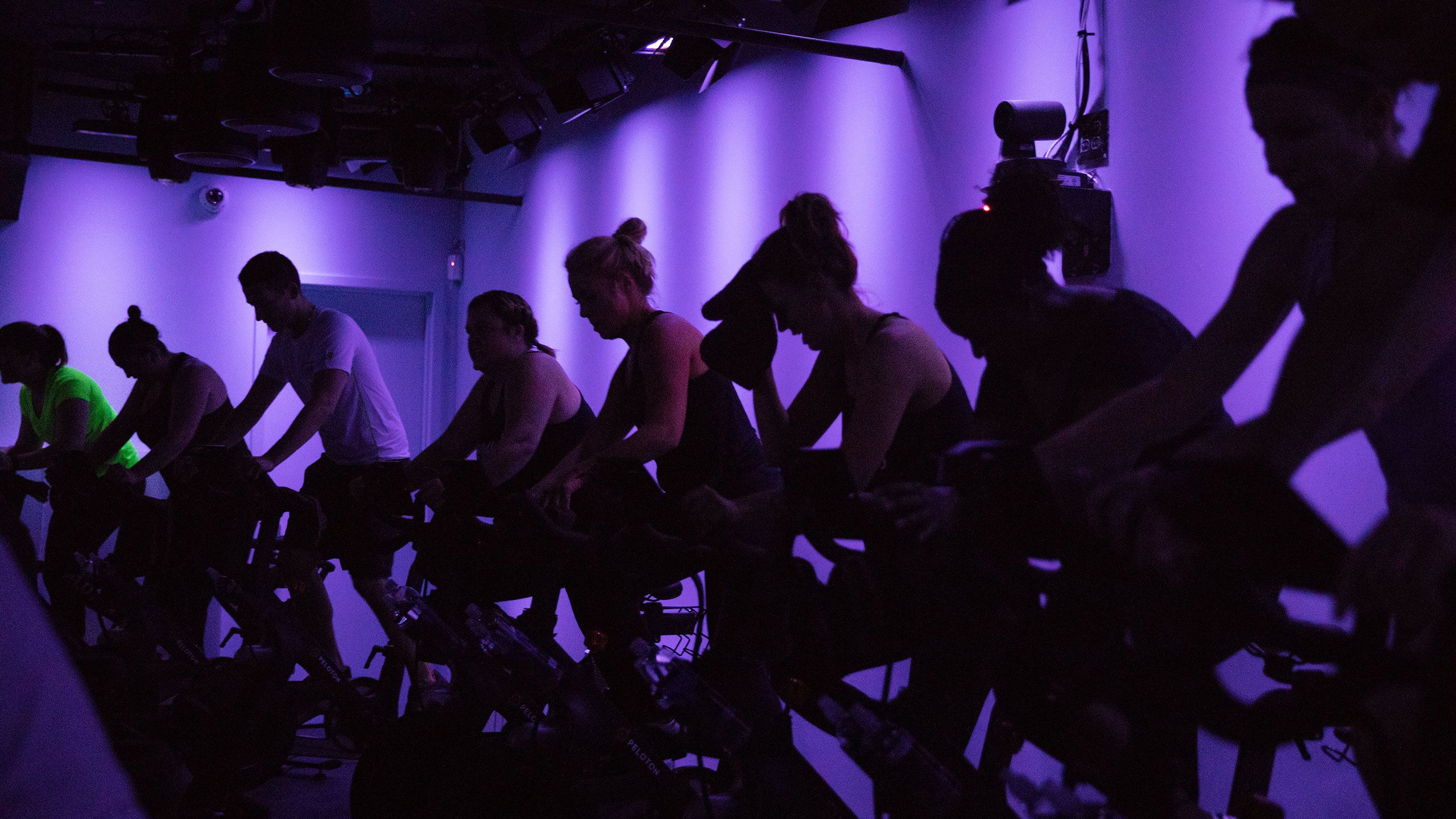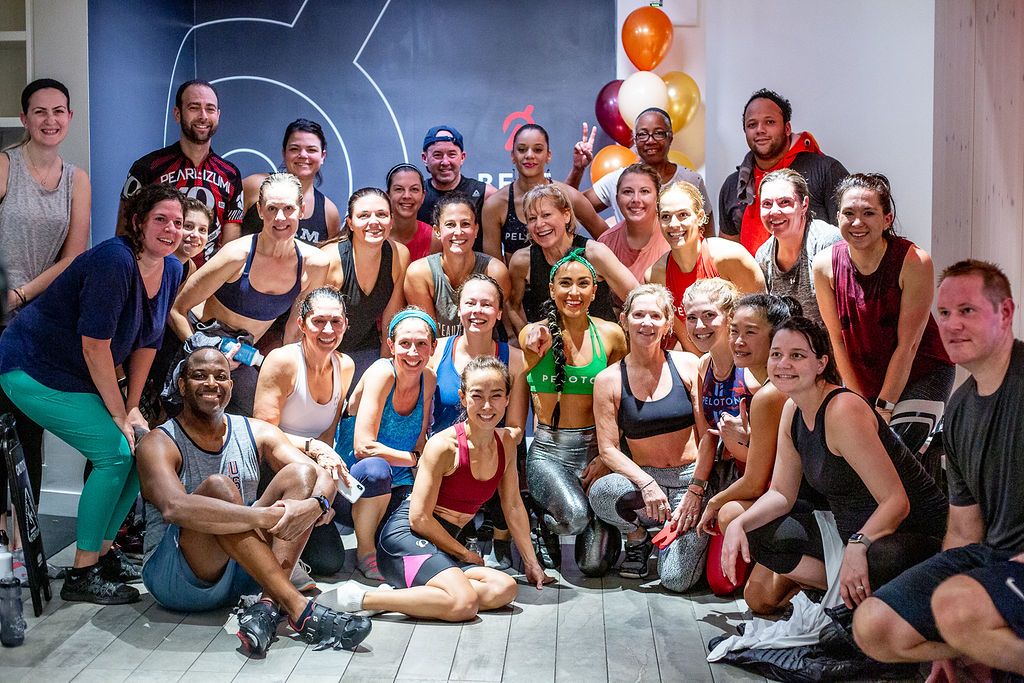
The Reason Why Indoor Cycling Classes Make People Happy
There’s a scientific reason for those feel-good vibes you get in a Peloton Class.
By Team Peloton•
Indoor cycling lets you be one with the machine.
In many cases, indoor cycling helps you take charge of your mental health.
The more sweat from working out on a bike, the better.
You experience a state of hypnosis while working out.
Finding a fitness-focused community lightens your load.
Need a pick-me-up? It’s time to start sweating. Exercise triggers the release of endorphins, which are a cluster of feel-good hormones in your body linked to an increase of mood and overall feeling of happiness. Taking indoor cycling classes on a Peloton Bike is a prime example of an endorphin-releasing exercise.
There’s a certain feeling that you get while you’re riding at home that keeps you coming back. Maybe it’s a sense of security, a feeling of accomplishment, or perhaps, an escape from the hustle and bustle of everyday life. No matter the personal reason why you think working out on a bike lifts your spirits, there are countless research studies that prove the participation in classes like Peloton actually lead to an overwhelming feeling of happiness and fulfillment. And it’s not just because of your output or performance level. While you get your cycle on, you face challenges head-on, lose yourself in the sweaty movements, and experience an overwhelming state of calm, along with a slight adrenaline rush, while you’re powering through those tough hill climbs: indoor cycling sparks an incredible sense of joy because of the class structure itself.

Indoor cycling lets you be one with the machine.
Everyone needs a buddy to lean on, and during cycling classes, you can rely on your Peloton Bike (or the indoor cycling bike of your choice paired with the Peloton App) to carry you through the toughest moments. Sure, your bike doesn’t pat you on the back or empower you with words of affirmation, but it still offers a level of support that can’t be matched. In Ben Irvine’s book Einstein & the Art of Mindful Cycling, he compares the relationship between a person and their bike to “the feeling you might have for a much-loved dog. And while your bike might not give you the same level of love (sorry but true), it allows you to explore uncharted territory — without going it completely alone.“ In evolutionary terms, humans have an innate desire to explore, to boldly go. I think there’s a psychological reward that comes from satiating this desire,” he writes. “What’s more, when you’re running, you’re far more limited for distance and speed. On a bike, you can cheat time.”
In many cases, indoor cycling helps you take charge of your mental health.
Let’s get this out of the way: Working out on a bike won’t get rid of your depression, anxiety, or stress on its own. Exercise works best to support mental health when it is paired with medication and/or professional treatment. That being said, a 2018 study by the University of Michigan found that people who regularly attend cycling classes have reduced depression and anxiety compared to those who skip working out altogether. In fact, people who were very active (think: taking about five classes a week) were 52 percent happier than those who never or rarely hit the gym.
To see improvements in your mental health and overall wellbeing, the study suggests hitting the saddle hard and often a.k.a. going to the cycling classes regularly and working out as hard as you can once you’re there. Numbers-wise, it translates to somewhere between 150 to 300 minutes of solid, sweat-inducing exercise each week. So keep clipping in, keep coming back, and keep making the Peloton Bike a part of your daily routine.

The more sweat from working out on a bike, the better.
Starting now, let’s end the stigma of sweat once and for all. Why? Because according to research published in Psychological Science, a journal of the Association for Psychological Science, the smell of sweat can actually trigger positive emotions — happiness included. Here’s the catch: A sweaty smell only initiates a positive response when the person doing the sweaty is genuinely happy — you know, like you while you’re doing your thing in an indoor cycling class?
Picture this: You’re in the middle of an uphill sprint — sweat pouring down your face and all — and the pump-up music along with your motivating Peloton instructor makes you feel all the good feels. Even if your fitness buddy is struggling to push through, the aroma of the chemical compounds (or chemosignals) that you're releasing from your sweaty, happy state will rub off on them. "This suggests that somebody who is happy will infuse others in their vicinity with happiness. In a way, happiness sweat is somewhat like smiling — it is infectious,” Gün Semin of Utrecht University in the Netherlands, senior researcher on the study, says.
You experience a state of hypnosis while working out.
Indoor cycling classes are meant to test your endurance, drive, and self-motivation (among other things). The challenge of amping up the resistance, increasing the speed, and maintaining a steady pace actually promotes a deep sense of calm for many, at least according to psychologist Alice Pinion. “The same changes occur in the brain during exercise as during hypnosis. When you’re able to get yourself into ‘the zone’ during a ride, or a turbo session, it’s no exaggeration to call it a form of self-hypnosis,” she tells Cycling Plus. When you’re in the midst of your biggest challenge (think: the final sprint at the end of class), she claims that “ the brain is ideally conditioned to be open to positive suggestion.” That means that when you push yourself past the limits you set for yourself, you can end your time on the bike with an overwhelming euphoric high that lasts well beyond your workout.

Finding a fitness-focused community lightens your load.
Exercise aside, the social component of indoor cycling classes has a tremendous effect on your overall mood and stress levels. In a 2017 study by American Osteopathic Association, they found that regularly working out with others improved the emotional health of participants by 26 percent, which is even more than the physical health benefits (24.8 percent). It’s simple: “The communal benefits of coming together with friends and colleagues, and doing something difficult, while encouraging one another, pays dividends beyond exercising alone," says Dayna Yorks, DO, lead researcher on this study.
And those benefits hold true however the community comes together––high-fiving your friends on the leaderboard via the Peloton Bike is just as effective, for health purposes, as high-fiving IRL. As long as you feel like you have a group of people rallying behind you to power through that climb, you’ll feel supported and best of all, happy.